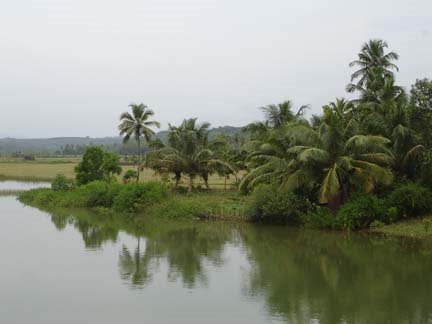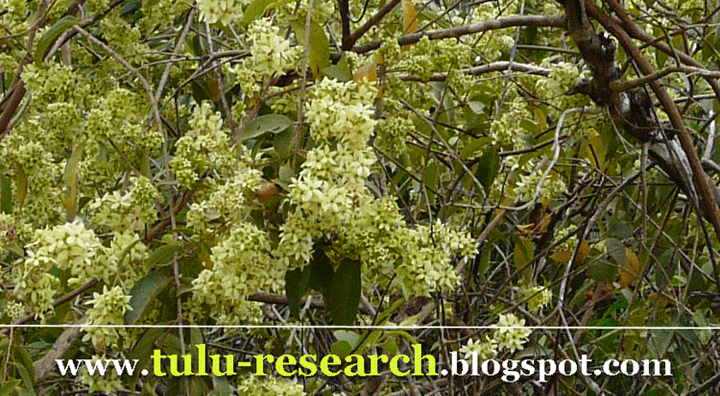Scientists
explain that our forefathers, the human beings, evolved at a place in Africa
and migrated to different parts of the world with passage of time. Naturally, the primitive words which formed
the building blocks of the early languages and vocabulary also travelled with
migrating people to different parts of the world. The existence of common
analogous words in different languages, stand mute testimony to this essential
fact. Of the numerous basic words adopted and inherited by our people,
Putu/Pudu appears to be one such basic word.
 |
| Location of Pudu Village |
Pudu: A place name
Travellers
frequenting on the Mangalore-Bangalore Highway might have been familiar with a
place known as Farangipete, located
about 14 km from Mangalore. It is situated on the northern bank of River
Netravati. The “Farangi-pete” as the
name reveals was a settlement of farangis
(=the foreigners). (pEte/ pEnte =township;
pEte, Kannada; pEnte, Tulu). It can be presumed from the place name that the early
colony of Farangipet was adopted by probably British people who settled in this
area during the period 17th or 18th Century CE.
However, since
the Farangipete is an integral part of the village known as Pudu, we can infer that the original
name of Farangipete was Pudu.
We shall
discuss the place name Pudu and its possible significance in the evolutionary
history of Tulu language and the Karavali. Incidentally, our survey shall also
include the place name Puttur which
now people preferentially interpret as Poota-oor
or the village of flowers.
Pudu
The ancient
place name Pudu originally meant a
new settlement. It can be emphatically said because numerous villages all over
India still carry the prefix of Pudu in the place names. However, we find that
in Tamilnadu villages with Pudu prefix abound as can be seen in the following section : Pudu villages in India.
The term
Pudu in the sense of new settlement does not explicitly exist in present Tulu
usage that shows the nature of changes that the language has undergone over the
historical evolution.
Please note
that the word Pudu also has another meaning in Tulu: Pudu2=dove, pigeon.
Puduvettu
Puduvettu is
a remote village in Belthangadi taluk, Dakshina Kannada on the foothills of
Sahyadri (Western Ghat) ranges. However this place name is not exclusive to
Tulunadu; we can find similar place names in Tamilnadu.
Puttur
Puttur is a
major town and a Taluk headquarters in Dakshina Kannada district. The place
name Put+ur reveals that it was a new village when built probably about two
millennia ago. However, now Tulu people in general have forgotten the original
meaning of the word Putu and interprete the word as poo (=flower) or pootta
(=related to flower) resulting in the meaning of the Puttur town being interpreted as village of
flowers.
Puthige, Puthila
The place
name Puthila (Putu+ila) refers to a new
settlement. Similarly Puthige
(Putu+ige) also means a newly built place.
Satiyaputo
Satiyaputo
was the name of a capital town in Tulunadu during the regime of King Asoka regime (ca 300 BC). Possibly the Satiayaputo
is the Pali/Prakrit version of the place known as ‘Satyanapura’ in the famous Siri PaDdana. (This blogger in an earlier Post (No 309)has suggested that the Satiyaputo refers to Saccheripete area, the centre stage of Siri paDdana).
Thus the Pali/Prakrit term Puto is equivalent of Putu or Pudu in Tulu and other Dravidian languages. The Pali term puto possibly evolved into pura in Sanskrit. (Some people may like to think vice versa depending upon their preset conceptions).
Alternately, it can
be inferred that the word existed in early Tulu and vanished from the usage
later. Probably the early Tulu was much similar to ancient Tamil as also suggested
by references to ” Tulunatta Tamil” in ancient Tamil Sangam texts.
Puta : An Ancient
Word
Put, Puta is
an ancient word for new, or new born. In ancient Sumerian language the word
‘puta’ meant womb, the organ responsible for the birth of the new baby. In many languages, it has retained the
original meaning of new born or newly established/created especially in Dravidian and
Prakrit and related / derived Indian
languages.
Relevant
Tulu words
Posat='new' (festival); also known as Puddar
festival; festival celebrating arrival of new paddy from the fields.
Puddar= put/pud+
bār (=New paddy: Newly harvested paddy). Pudbār > Puddar. An annual traditional farming festival celebrating the advent of new harvest.
Also known as ‘Posat’ (= New).
Podu= new (matrimonial) alliance.
Podu= new (matrimonial) alliance.
Pudar=put+ar= Name: A newly designated word (=name) to a person or object.
Pudu, Pudur,Puttur = new town. The Old Tulu word was apparently quite analogous to Old Tamil in the beginning?
Pudu, Pudur,Puttur = new town. The Old Tulu word was apparently quite analogous to Old Tamil in the beginning?
Puttubari / Puttupurapu = family profile, family honour and traditions.
Puttu/Putta/Puru = small (Putta baale, Purubaale).
Puttu = Beloved child, ( female or male ).
Puttye = Ant hill. ( A earthen structure built by ants and occupied by Snakes)
(There is an alternate proposal for the place name Puttur that can be explained from Puttye or ant hill.)
Pudelu = wild bush or sapling.
Purye= roof,ceiling or shelter. Note the Tulu proverb: "Taregonji purye bodu" ( =Every head needs a shelter)
Other Dravida
/derived languages
Pudu, Putu (Tamil), Put+u(r)= newly established settlement.
Puttari (Kodava)=put+ari (= New rice: Newly harvested rice). Kodava synonym for Puddar festival. Huttari ( Kannada). Puttari> Huttari.
Puttari (Kodava)=put+ari (= New rice: Newly harvested rice). Kodava synonym for Puddar festival. Huttari ( Kannada). Puttari> Huttari.
Putu (Malayalam
and Beary )= baby, boy . Pudu-varsham (Malayalam)= New Year.
Pudu in Prakrit, Punjabi and Sanskrit usages
Puttar
(Punjabi)= baby; son/daughter. Puta, putra1=newly arrived baby; boy
Putra2=
(Prakrit/Pali)= newly built town. For example, Pataliputra.
Putri= new
baby girl.
Pudu
villages in India
Andamans: Pudumadurai
Andhra
Pradesh: Pudu, Pudur, Puduru,
Arunachala Pradesh:
Puduwan.
Assam: Pudum Pukhuri
Chattisgarh:
Pudu.
Karnataka: Pudu-kallahalli, Pudu, Puduvettu, Puttur.
Kerala: Pudussery, Puducode.
Manipur: Pudunamei.
Orissa: Puduni, Pudunisaga, Pudunbadi,Puduga
pathor,Pudugabali, Pundungi padar, Pudugasil.
Puducherry: Pudukuppam.
Tamilnadu:Pudugummidipundi,Pudupalyam,Puduvoyal,Pudupakkam,Puducheri,Pudukuppam,
Pudumaealnagi,Pudupattu,Puduppair,Pudupattinam,Pudupattu,Pudukesavaram,Pudur,Puduppadi,Pudurnadu,Pudupatti,Pudukottai,Pudukotti,Puduchengam,Puduchekkadi,Pudupalapattu,Pudukalani,Pudupuliyampatti,Puducombai,Pudupeerkadavu,Puduvadi,Puduruthamanur,Pudukudi,Pudukkudi,Pudurpalyam,Pudunaduvalur,Puduvettagudi,Pudumapalayam,Pudukkodai,Pudukuraipettai,Puduthurai,Pudupathur,Pududevangudi,Pudunagar,PudukottaiUllur,Pudukottagam,Pudunagar,Pudurivayal,Pudunilavayal,Puduvakkadu,Puduvettivayal,Pudukilavachi,Pudukkulam,Pudusukkampatti,Pudukulam,Pudur,Pudumadam, etc.
Pudumaealnagi,Pudupattu,Puduppair,Pudupattinam,Pudupattu,Pudukesavaram,Pudur,Puduppadi,Pudurnadu,Pudupatti,Pudukottai,Pudukotti,Puduchengam,Puduchekkadi,Pudupalapattu,Pudukalani,Pudupuliyampatti,Puducombai,Pudupeerkadavu,Puduvadi,Puduruthamanur,Pudukudi,Pudukkudi,Pudurpalyam,Pudunaduvalur,Puduvettagudi,Pudumapalayam,Pudukkodai,Pudukuraipettai,Puduthurai,Pudupathur,Pududevangudi,Pudunagar,PudukottaiUllur,Pudukottagam,Pudunagar,Pudurivayal,Pudunilavayal,Puduvakkadu,Puduvettivayal,Pudukilavachi,Pudukkulam,Pudusukkampatti,Pudukulam,Pudur,Pudumadam, etc.
West Bengal: Pudung Kasmaral.
Origin of Shades of meaning
The term Puta (=womb) or its equivalents Putu/Pudu appears to be one of the
oldest words for creation known to our forefathers since Sumerian Period which
is generally considered to be one of the oldest documented languages in the
world. Creations, as
in the perspectives of the early ages, generally referred to the production of
new babies, agricultural crops or the construction of new townships.
Various derived or modified or corrupted forms of the word Put/Pudu are
in current usage in several European as well as Indo-Aryan and Dravidian languages. (For example
puta in Greek means a Goddess of
agriculture or a Roman Goddess of pruning trees. However, in Hebrew the
word refers to
female genitalia. In Portuguese and Spanish it means a bitch or whore and so on. Similar usages can also be seen in Tulu and other Indian languages.)
Significance of Pudu place names
The Pudu, as
far as place names concerned, appears to represent newly constructed village or
townships in ancient days. The word is still exists in Tamil and Malayalam but has
become obsolete in Tulu. However, the existence of Pudu Villages in Tulunadu
(such as Pudu, Puduvettu, Puttur etc.,) reveal that the word existed in early
Tulu. In that case the places like Pudu, Puduvettu and Puttur were established
quite early in the history probably corresponding to early centuries of the
Common Era.
However, even
though the word pudu has been vanished
in current Tulu usage it has been modified or evolved to usages such as podu (in Tulu) which means a new matrimonial
proposal or alliance.
⃝


